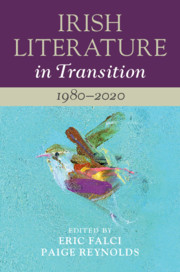Book contents
- Irish Literature in Transition, 1980–2020
- Irish Literature in Transition
- Irish Literature in Transition, 1980–2020
- Copyright page
- Contents
- Contributors
- Series Preface
- General Acknowledgements
- Acknowledgements
- Introduction
- Part I Times
- Part II Spaces
- Part III Forms of Experience
- Part IV Practices, Institutions, and Audiences
- Index
Introduction
Published online by Cambridge University Press: 28 February 2020
- Irish Literature in Transition, 1980–2020
- Irish Literature in Transition
- Irish Literature in Transition, 1980–2020
- Copyright page
- Contents
- Contributors
- Series Preface
- General Acknowledgements
- Acknowledgements
- Introduction
- Part I Times
- Part II Spaces
- Part III Forms of Experience
- Part IV Practices, Institutions, and Audiences
- Index
Summary
In the final decades of the twentieth century and into the first years of the twenty-first, both the Republic of Ireland and Northern Ireland experienced dizzying societal changes. At the beginning of the period at hand, in the early 1980s, conditions across the island seemed drearily familiar: the Irish economy was mired in recession, outward emigration was on the increase, social and political policy in the South continued to align with Catholic doctrine, sectarian conflict in Northern Ireland persisted, and the hard border between the Republic of Ireland and the North remained a fraught space of armed and ideological struggle. Yet halfway through these decades, on the cusp of a new millennium, the Irish economy was so strong that it had been anthropomorphised as the Celtic Tiger, inward immigration outpaced emigration, the longstanding moral authority of the Catholic Church had been destabilised, and the Good Friday Agreement indicated that the violence of the Troubles would diminish or even cease entirely.
- Type
- Chapter
- Information
- Irish Literature in Transition: 1980–2020 , pp. 1 - 24Publisher: Cambridge University PressPrint publication year: 2020
- 1
- Cited by

